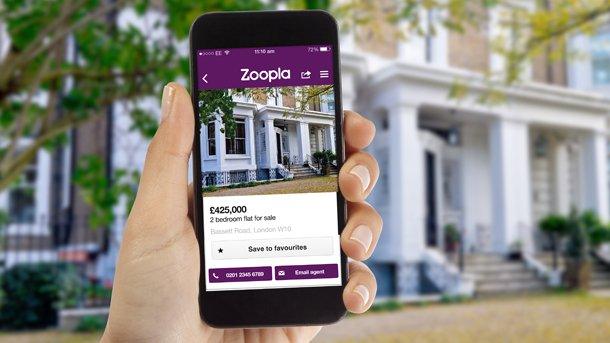'No DSS': Renters on benefits still turned down for housing
- Published
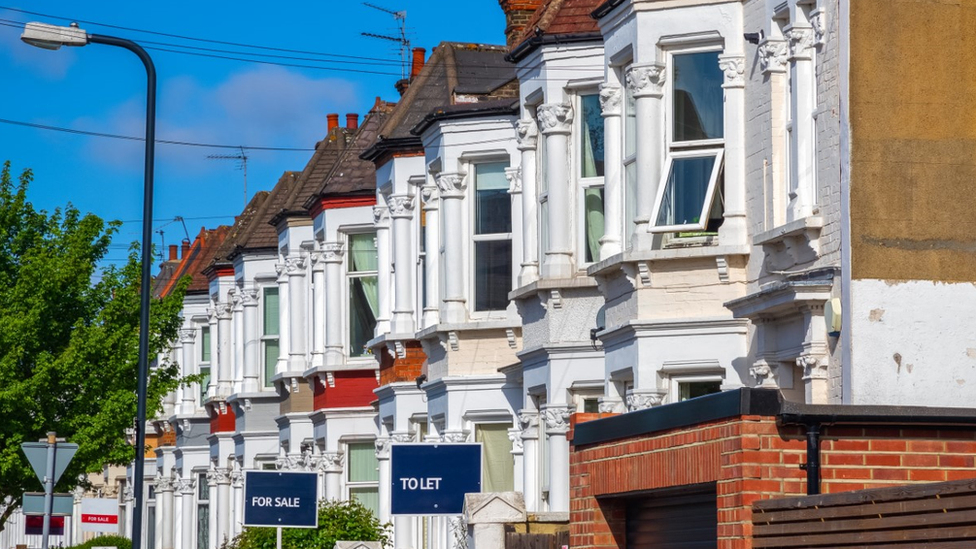
More than a year after a judge ruled blanket bans on renting properties to people receiving benefits were unlawful in a landmark case, many people say they are still facing discrimination by landlords. The BBC spoke to three people who said 'No DSS' was still a reality - with agents and landlords ignoring some applicants or putting "incredible barriers" in place.
'I've applied to rent more than 200 properties'
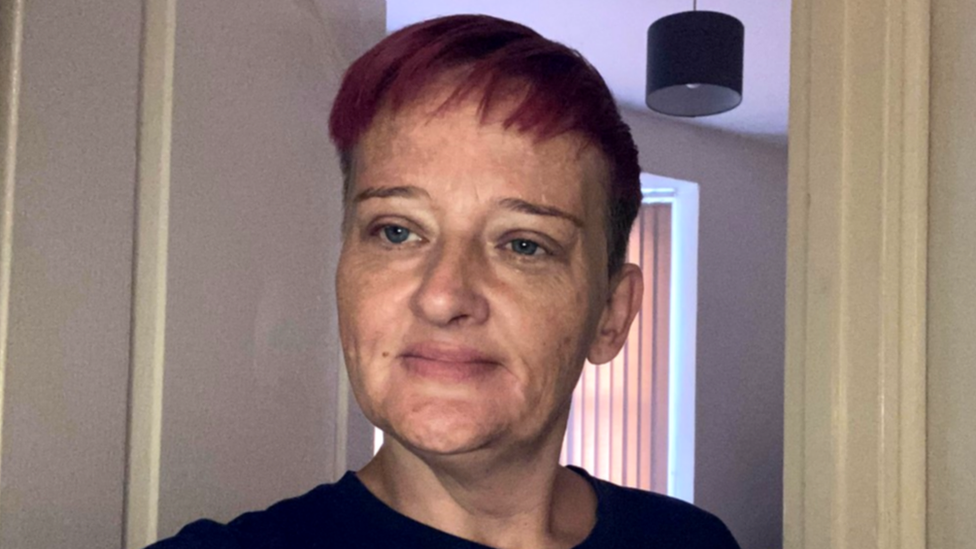
"Treat everyone the same... it doesn't matter how much money you've got," said Paula
Paula Manning has lived with her 19-year-old daughter in a privately-rented flat for three years after her disabled husband went into a care home.
Now she's "stuck" in the two-bedroom property in Bilston, West Midlands, and desperate to move out - but can't because she said hundreds of landlords would not accept her because she's on benefits.
"I've applied for more than 200 properties - so many that we've now stopped counting," she said.
"We get our hopes up and at the last minute, we know what will happen at the final stage. We won't get it."
Insurance broker Mortgage for Business claims the vast majority of private landlords are now accepting of tenants who are in receipt of benefits.
But that isn't Paula's experience, with agents repeatedly ignoring her calls, she said, adding: "Sometimes they say the landlord has decided to sell - or you are asked for a guarantor who earns more than £60k and owns their own home."
The 48-year-old, who has the lung condition COPD, lupus and arthritis, said she had been made to feel ashamed of receiving disability and housing benefits and universal credit.
"We have to lose this stigma where people think because you're on housing benefits we are dirty people that live like animals," she said.

Some hopefuls are being asked for 12 months rent up front and guarantors who earn more than £30,000 a year
The term "no DSS", which was often commonly seen in property adverts, is a reference to the old Department of Social Security which was replaced by the Department for Work and Pensions in 2001.
In July 2020, a single of mother-of-two fought a successful court battle after a letting agent refused to rent to her and the practice was ruled unlawful.
But less than six months later, an investigation by the BBC found many property site listings excluded renters on benefits.
One of the few property search sites which continues to give people the option of filtering 'accept DSS income' is the online website OpenRent - which did not want to provide a comment to the BBC.
Paula said she was losing all hope of being able to move, after widening her search out of Wolverhampton and still facing the same problems.
"All we want is fairness. All my life I have worked and it's not my fault I'm in this situation. Surely we have the right to live somewhere nice and to be treated the same whether you're on benefits, got one leg or two heads."

'They think people sit around all day, smoking and drinking'
Helen Williams says her daughter has applied for more than 60 properties
Helen Williams has spent months trying to find a property for her daughter Rachel and two young grandsons, who have been told to leave their home by November after the landlord decided to sell up.
Helen, of Shirley, Solihull, said they'd been left feeling "really angry" after being rejected for more than 60 properties in a few months.
"I'm devastated in all honesty," she said.
"At the moment we don't even know where she will be at Christmas. She's got all her extended family nearby to help her at the moment. We don't know where she will end up."
Rachel, who receives universal credit, has been asked to provide 12 months rent up-front if she is to be considered for a property, as well as a guarantor earning in excess of £35,000 - something Helen said she wasn't able to do on her NHS care assistant salary.
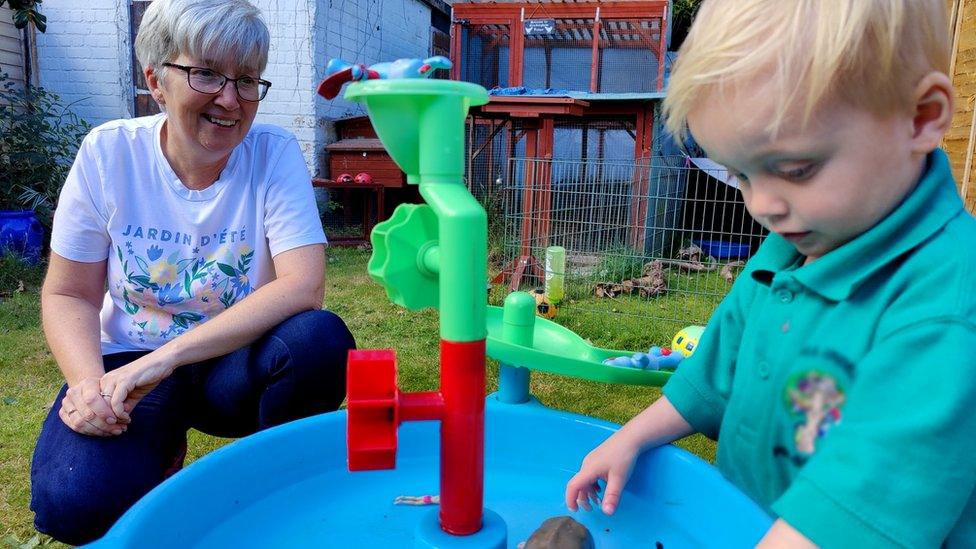
Helen said she was devastated at being unable to help her family find somewhere to live
Helen said she wanted to speak out so other people in their situation knew they were not alone.
"This is massive - on social media lots of people are all saying the same thing," she said.
"There are very few landlords and agents who will even consider them. What they don't remember is that for a lot of people on universal credit, it is a top up, these people are not work-shy.
"They think people sit around all day, smoking and drinking. Sadly the likes of Benefits Street [Channel 4 documentary] puts a bad slant on people.
"Rachel is just as good as anyone else."

'They're asking for ridiculous amounts of money up front'

Laura says she will not give up hope of finding a house for her sons
Single mother-of-three Laura Goodall-Barton dreams of moving from Wolverhampton to north Devon with her sons to be near her brother - but cannot find a landlord or agent who will agree to let a property to her.
In 2020 she was asked for a £6,000 deposit because she was unable to provide a working guarantor, but she refused because she didn't want to get into debt.
She said she was continuing the search for her boys, despite feeling discriminated because she receives universal credit.
"I want them to live somewhere better. I won't give up because of them. They are my drive to give them a better future. Whatever anyone throws at me I will keep going," she said.
"I saw a beautiful house and it was close to a school and was perfect but I was told 'no' because their mortgage doesn't accept anyone on benefits and they wanted someone who was working.
"There's a lot more the government can do to stop people being asked for ridiculous amounts of money up front.
"Not many people have a guarantor or have family or friends where you can ask 'can I use you?'"

'There's need for fundamental reform'

Shelter's Polly Neate said many were culturally-biased against those who receive benefits and that was "playing out on the rental market"
Polly Neate, chief executive of housing charity Shelter, said discrimination against people on benefits was unlawful and continuing despite the legal cases.
"Unfortunately, we are aware that this is still going on," she said.
"I think that's what you get with very deep-seated, almost institutionalised prejudice in this country.
"Landlords charging excessive deposits and so on, that is another way that they're trying to get around not letting to people on benefits."
Ms Neate said there was a need for fundamental reform of the private renting system.
"The government have promised that they're going to bring forward a renters reform bill but unfortunately it has been delayed.
"There's an appalling shortage of homes that people on low incomes can afford to rent and increasingly we're seeing people who are working but simply cannot afford anywhere to live and it is not a tolerable situation."

How to challenge 'No DSS' discrimination
Keep a written note of phone and face-to-face conversations if you start to hear a "No DSS" message. Hold on to any emails
Make a formal complaint to the landlord or agent
You can also contact The Property Ombudsman, external and your local MP, external on the issue
Organisations including Shelter, external provide information on how to tackle discrimination

A spokeswoman for the National Residential Landlords Association said no-one should be excluded because they were receiving benefits, adding that the benefits system was in "urgent need of reform".
"This needs to include scrapping the five-week wait for the first payment of universal credit, giving all tenants the ability to opt to have the housing element paid directly to their landlord and ensuring it is sufficient to cover average market rents in a given area, not just the lowest 30%," she said.
"It is troubling that the chancellor has frozen the rates of housing support in cash terms."

A spokesman for the Department for Levelling Up, Housing and Communities said: "Everyone should have access to secure and safe housing and blanket bans against tenants on benefits have no place in a fair and modern housing market.
"We have worked with the lettings industry to end this practice and strongly encourage landlords and agents to look at all potential and existing tenants on an individual basis."

Follow BBC West Midlands on Facebook, external, Twitter, external and Instagram, external. Send your story ideas to: newsonline.westmidlands@bbc.co.uk, external
- Published18 December 2020
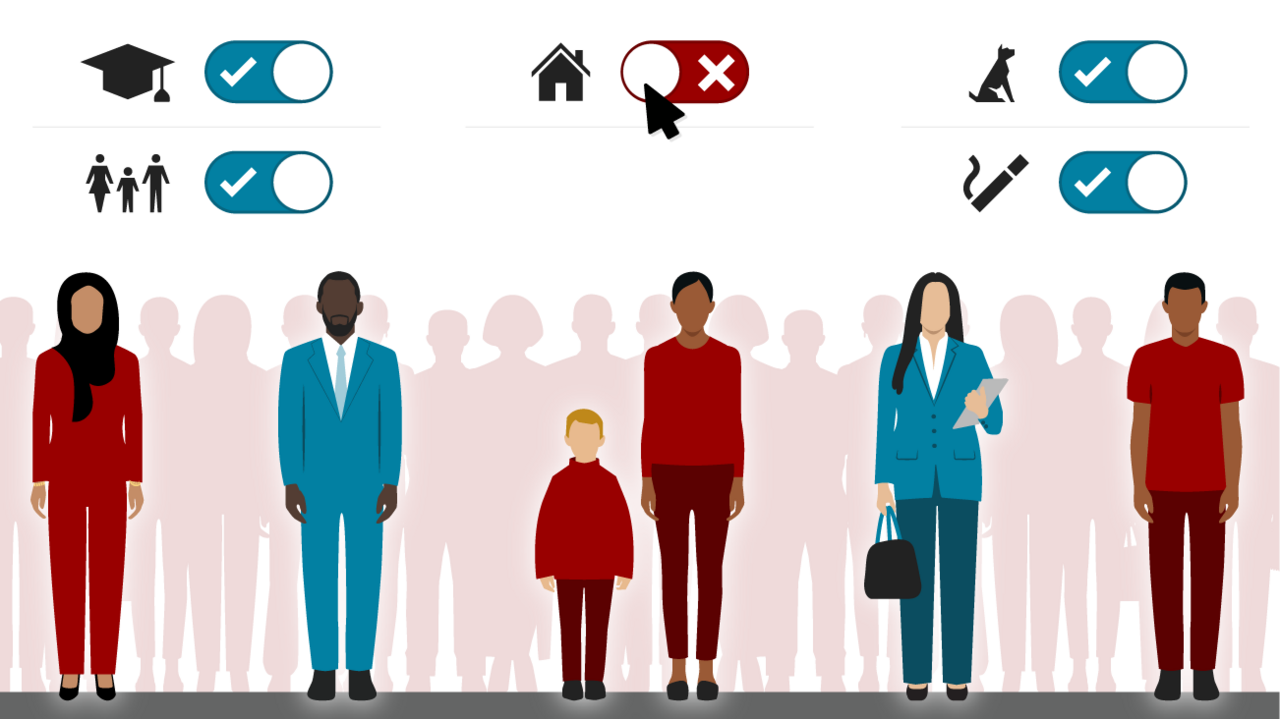
- Published14 July 2020
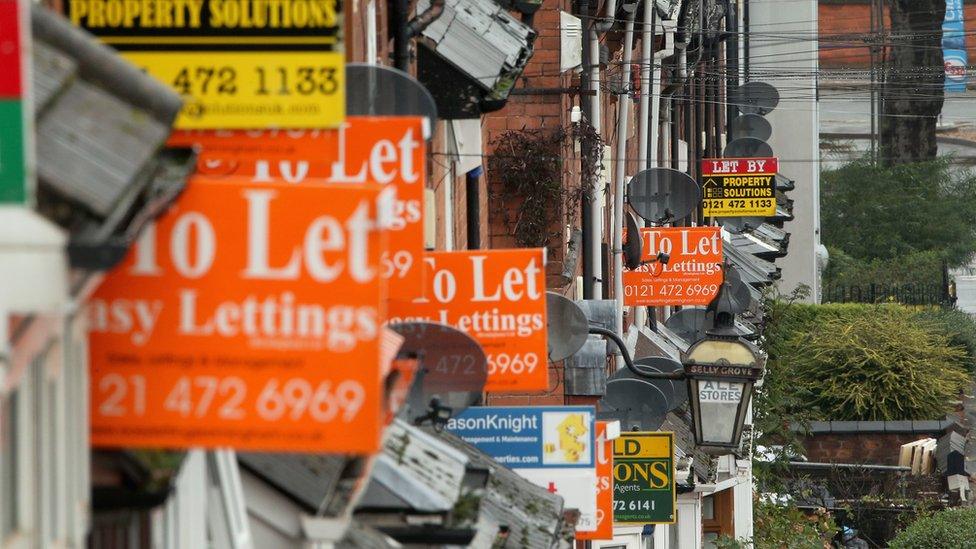
- Published27 February 2020
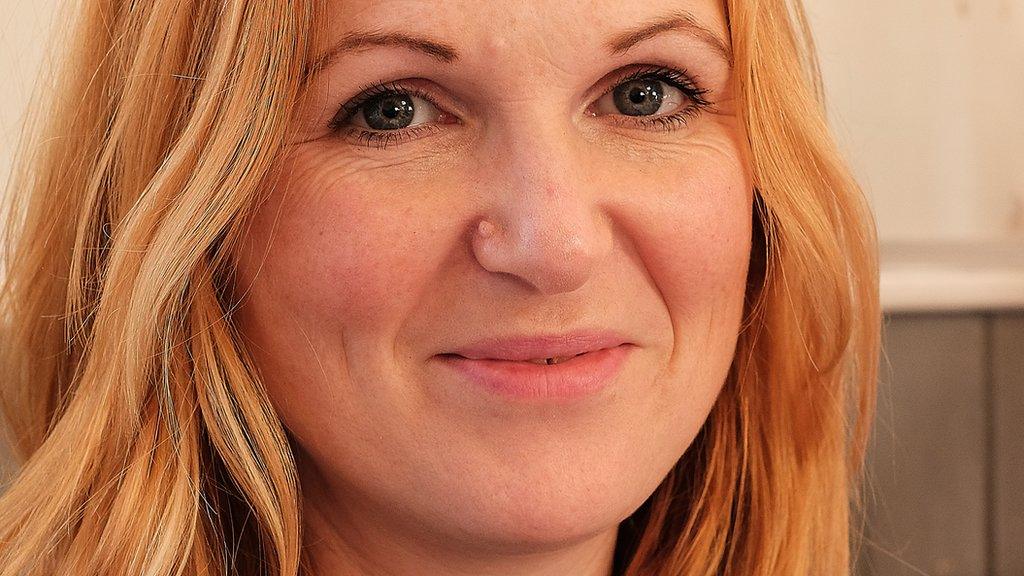
- Published26 February 2018
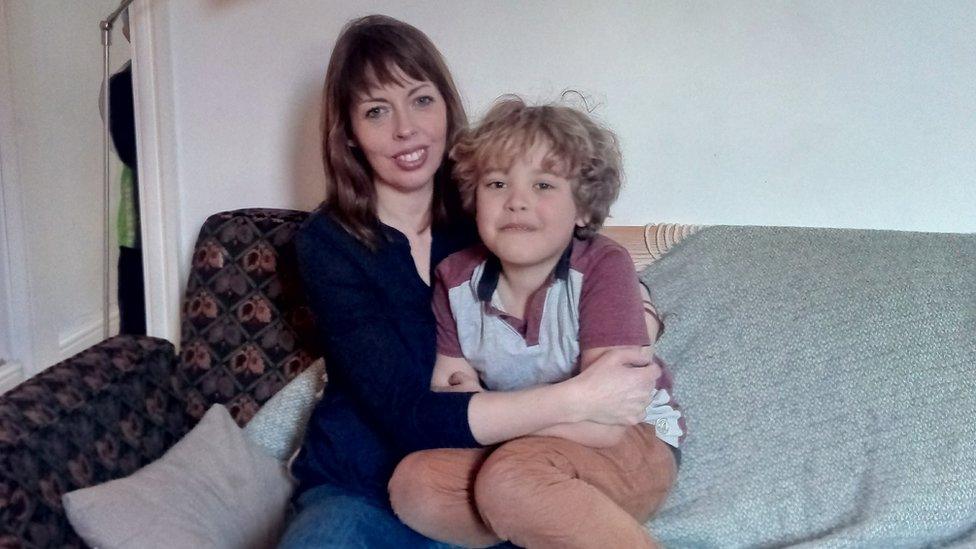
- Published15 March 2019
